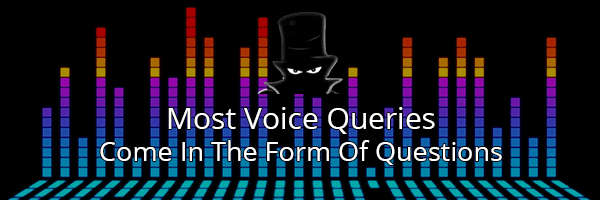Complete Voice Search SEO Guide

Complete Voice Search SEO Guide
Voice Search SEO is quickly becoming a norm in website audits and for a good reason. In 2016, 1 in 5 mobile searches were voice searches, and it’s estimated that by 2020 50% of ALL searches will also be voice searches. Voice search SEO is, surprisingly enough, not quite as complex as you might think. Let’s quickly tell you all about it
Voice search is any inquiry that is made through a virtual assistant in your Smartphone, Desktop PC, gadget or any other entry point such as Amazon’s Echo. Advances in artificial intelligence and natural language processing have allowed our digital assistants understand our searches’ intent and contextual meaning, which in turn, provides relevant results to our queries.
Mobile devices, smartphones and smart home gadgets have incorporated Siri, Cortana, Alexa and Google Assistant as part of their toolkit designed to make searching and purchases online easier than ever. Bottomline is, we’re constantly aiming to improve user experience and convenience in our lives, and this is one of the many reasons Voice Search SEO is becoming a key part of any local businesses seo strategy.
Voice Search SEO Growth
Imagine you’re driving, and the craving for some delicious pizza sets in. You might search for “italian restaurants near me” or “How late is AwesomePizzas open?” using your voice assistant application (because you’re a responsible driver and you’d never text and drive!).
Businesses that incorporate voice search seo as part of their marketing efforts, and leverage voice search optimizations will get first dibs on all voice search queries.

Right off the bat you might’ve noticed two things: first, the keywords you’ll want to target have a “conversational tone”, and second, that location can play a key role in voice searches, since a big chunk of them come from mobile devices and users like to favor businesses that are conveniently close to them. (Don’t worry, our voice search optimization guide will touch on these important topics further on!)
Another big reason why you should optimize for voice search seo is because “voice input searches”, as defined by Microsoft’s Cortana, are more and more common.
Moz published an article that determined around 33% of queries are, in fact, voice searches. Keep in mind this data is two years old, and since the introduction of Windows 10 there’s a very good chance this number is even higher today.
Before we begin optimizing and getting all this juicy voice search traffic, we need to understand who, we’re targeting with our voice search SEO efforts.
Voice Search SEO: Understanding Our Target
Understanding a demographics and target is one of the first tasks we need to do when we’re thinking of starting a new business, and it’s no different in the world of voice search seo.

Data suggests that:
71% of users between 18-29 years old actively use their mobile personal assistants, whether it’s Alexa, Cortana or Google’s assistant. Younger demographics tend to be more “tech-savvy” and easily transition into adopting newer technologies, so this high percentage actually makes a lot of sense.
Around 59% of users between 30-43 years old conduct voice searches over their devices. This makes up for a large percentage of users, many who are, economically speaking, quality prospects for many businesses. Yet another reason not to ignore voice search optimization.
Finally, we got our segment of users that are over 54 years old. Naturally, since it was a relatively new technology at the time this study was conducted, their digital assistant usage was lower (around 38%). If you ask me, it’s still a very large portion of queries that I wouldn’t ignore, not to mention there’s a good chance this number has also grown.
Teaching an older person how to use their Smartphone to browse the web is significantly harder than just saying “talk to your phone”. Digital assistants are destined to become a new milestone in user-friendly interactions, and older folks are going to rely more and more on them. You can bet on that.
So now that we understand who uses voice search, we can start our voice search optimization and make sure we get that huge portion of traffic.
Voice Search SEO: Keyword Research
According to the internet’s Trends Report in 2016, around 22% of voice search queries were related to local information, and 30% of all queries were related to general information. Not unlike regular text SEO, keyword optimization is fundamental for effective voice search SEO. This is why it’s important we understand the subtle differences between the two.
Remember when we talked about regular SEO keyword research, and the different kinds of keywords?
If you haven’t, I highly suggest you take a look on your spare time, but for now let’s discuss voice search optimization and what sort of keywords tend to have a stronger commercial intent.

Let’s go back to our initial example. We’re in the car, we get a craving for pizza, but not just any pizza. We want AwesomePizza’s pie, because we’re picky eaters like that. So we take out our Smartphone and tell our digital assistant we want to know where the nearest AwesomePizza establishment is.
When we want to know where we need to go, that means we’re not looking for information, in fact, we already decided we’re going to spend money, in this case, on a pizza. This is precisely why, if you’re running a local business, you’ll want to optimize for queries that involve “where”.
For example, “where is the nearest plumber”, “where is the nearest coffee house”.
This is because most of the people that are using their digital assistants are less likely to say “what are the least expensive and nicest vacation packages to Cancun?” than, say “Best Cancun Vacation Package” or “Cheapest Cancun Travel”, or maybe even “Cancun Travel Guide”.
If you’re part of the Cancun tourism industry, there’s a good chance you’re already ranking for say, “Cancun vacation”, so you’ll want to provide semantic context in the form of LSI (Latent Semantic Indexing) Keywords, and slap on a relevant headline.
Another big chunk of voice searches come in the form of questions. For example, you might find queries like “what is the best Cancun vacation package?”. Why, yours of course!
Thanks to Google’s hummingbird update, you don’t have to specifically rank for such a query or its keywords, all you have to do is provide context. Maybe you can do so in the form of a FAQ section, or webpage. One of them could be “What is the cost for air fare to Cancun?” or “What’s the best Cancun vacation package?”.
The possibilities and combination of queries you can cover are endless.
Think: What are the most common questions you find your clients or prospects repeatedly ask? Conduct a voice search seo keyword research, find out what they are, and incorporate them!
This doesn’t mean you should ignore, what, how or when type of questions. They’ll also bring you (potentially) effective traffic, and many of these sorts of questions might also have google rich snippets associated to them you can rank for.
In many ways, voice search SEO is not too different from optimizing and ranking for rich snippets. I highly suggest you check out or google snippet ranking guide if you haven’t already. No reason not to kill two birds with one stone, since it’s perfectly possible to optimize for both at the same time.
Voice Search SEO: Web Speed

One of the biggest factors in voice search seo is website loading time, or more specifically PageSpeed.
According to Google, “People want to be able to find answers to their questions as fast as possible”. Well duh! But how fast exactly?
Data from Backlinko suggests that the loading time of voice search results was around 4.6 seconds. Just so you get an idea, it’s estimated that the average webpage takes around 8.8 seconds to load.
Furthermore, the average Time to First Byte of a voice search result is .54 seconds, and the TTFB of your average website roams around 2.1 seconds.
Website loading speed is, today, more important than ever thanks to voice search SEO. We want Siri or Cortana to find our answers FAST. And they can’t very well access the information if the website takes 10 seconds to load, right?
Voice Search SEO: HTTPS Protocol
Another big factor is security, or rather how “safe” Google considers the source of information to be for users.
Hypertext Transfer Protocol Secure, also known as HTTPS plays a huge role in voice search seo, and how comfortable digital assistants are with using your content as an answer to queries.
Data suggests that over 70% of voice search results have a secure hypertext transfer protocol active in their website. HTTPS already represents a small boost in regular text-based SEO, so if you haven’t incorporated one yet, we highly suggest that you do.
The team at LetsEncrypt has free HTTPS certificates you can configure and use today. They’re fairly easy to implement, and it’s guaranteed to boost your SEO campaign, even by a little bit (or in the case of voice search SEO, by A LOT).
Voice Search SEO: Mobile Friendly Website

Talking about the importance of being Mobile Friendly in 2018 seems a bit overdone at this point, but it becomes absolutely critical when you consider that more than 40% of smartphone users are actively using their digital assistants. Keep in mind this study was conducted in 2015, the number has no doubt increased since.
You’ll want all of your content to be mobile friendly, easy to navigate and fast to load if you want to get the most out of your voice search optimization. Google has a nifty tool that can help you get on the right direction.
Once you’ve properly modified your content to Google’s standards, you’re ready to jump to the next step on the guide.
Voice Search SEO: Answer Length

Query answer length is not the same as content length. They’re two separate, equally important factors in voice search seo, and we’ll go over each. Let’s start with query answer length for voice search SEO:
Google’s assistant wants voice results to be brief, and straight to the point. In fact, the average voice search answer is 29 words.
So, let’s say you’ve opted to create a FAQ section on your website, and rank for rich snippets and voice search results. I recommend that for each question you wish to rank for, you create a draft in MS Word, and refine it until you’re at exactly 29 or fewer words.
It’s also important to make sure your answers can be understood by just about everyone. This means that you should build your answers at an average reading level of 9th grade.
Make it easy for Google’s assistant to read your answer, and make it easy for your prospects to understand exactly what you’re conveying.
This can take some time, since depending on the question, conveying complex information in under 30 words can be difficult. Take your time, you want your answer to be relevant and useful to your users.
Voice Search SEO: Domain Authority

We mentioned that Google loves to check for HTTPS certificates in your website to make sure you’re a safe source of information. But how do they measure if your information is reliable? How do they know if you’re an authority in your industry? Well, Data suggests they take a look at your website’s Domain Rating.
The average domain rating for voice search results is a whopping 76 DR (!!). Needless to say, this is a very high number. You might be wondering if Page Rating is a valid metric for digital assistants, and I’m afraid to say it doesn’t look that way.

It’s important to understand that it’s wise to invest in voice search SEO sooner than later. Digital assistants are here to stay, and purchasing a SEO ranking package from proven professionals might be the difference between earning hundreds, or millions down the line.
The average page rating for voice search results is a mere 21. The fact is, Google wants it assistant to give you what they consider to be the best answer, and that means going straight to the industry leaders in a specific field.
While we’re on the subject, 74% of Google Assistants results also came from a page ranking in the top 3 results for a specific query/keyword. This makes a ton of sense, considering the high Domain Rating preference in Google’s assistant algorithm, so there’s a fairly good chance these two are merely correlated.
Voice Search SEO: Word Count
Finally, we find a ranking factor that is equally important in regular text SEO and voice search SEO!
Content length, (which is different from answer length), means that the webpage your answers are featured ideally must have around 2.4k words.
This means, that your FAQ page should have a similar word length, or that the article you wrote must have around 2.3k-2.4k words and a small part of it must be dedicated to voice search SEO optimization for relevant questions/terms.
Voice Search SEO: Google Featured Snippets

You might’ve noticed this is a recurring subject in our voice search seo guide, and for good reason!
We made a very thorough guide on how to rank for Google Featured Snippets, and it’s easy to spot the similarities: they’re both brief answers straight from sources Google considers to be authorities in their respective fields.
In fact, it’s estimated that around 40% of all voice search results, actually come from featured snippets!
So, if you haven’t optimized for rich snippets, do so already! Just keep your answer length in mind, since snippets and voice search results ideal length varies.
Voice Search SEO: Local Traffic

Earlier we mentioned just how important voice search seo can be for local businesses, but voice search optimization alone is not enough if you truly want to take your online revenue to the next level.
We recently wrote an article on Local SEO optimization, I suggest you take a look at it and follow the steps required to improve your rankings.
Let’s once again return to our example scenario. Let’s say we’re in the car, but we’re actually on a completely different city (for example, Bakersfield), since we were visiting a family member. If you perform the same voice search query, you’ll notice that all the results listed will change, and you’ll get directions to the nearest “AwesomePizza” establishment in Bakersfield.
Your phone understands you’re originally from say, Georgia, but that you’re currently somewhere else. The fact it’s so sensitive to location (since most queries are conducted from a mobile device) makes voice search SEO incredibly powerful in local SEO.
For instance, Businesses that thrive from tourists are some of the biggest winners from voice search SEO, but that doesn’t mean that with some creativity it can end up being a major source of revenue for you too. Just make sure that your Google My Business and other review platforms such as Yelp and TripAdvisor are on point!
Final Words
Voice search was, initially met with skepticism, mainly due to its inaccuracies when interpreting human speech and overall feeling that it was a rushed technology. Those who predicted it was a fad that would soon die out are long gone, and it’s fairly obvious that voice search SEO is going to be a big part of online marketing in the years to come.
Digital assistants have earned a spot in our routine, and it’s important that we optimize our content so that they find it easy to link to. Getting the necessary domain authority to leverage google featured snippets and voice search results can be tough, which is why we recommend you buy PBN backlinks from professionals that can handle delicate investments without leaving any traces for Google to notice.

The game has certainly changed, and those who invest big on their Domain Authority via PBN backlinks and voice search optimization, will have a clear advantage in SEO in the years to come.
Thanks for reading!


